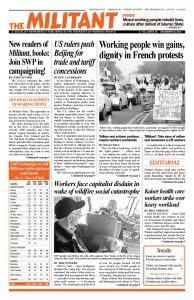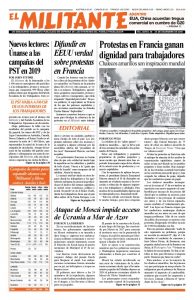December 27, 1993
Washington manipulated its economic might to shove concessions down the throats of Paris and Tokyo as the world trade talks under the auspices of the General Agreement on Tariffs and Trade closed December 15. After caving in to U.S. demands to reduce agricultural subsidies, French prime minister Edouard Balladur and governments grouped in the European Community defied pressures to give up more.
The Clinton administration clinched its demands on agriculture. Both Tokyo and Seoul agreed under pressure to open their markets to rice imports.
Washington landed blows to its rivals by using the higher productivity and lower wages, relative to its competitors, that the U.S. bosses have achieved through assaulting the working class in the United States. The biggest companies have eliminated 4 million jobs since 1980.
December 27, 1968
A hunger strike was begun Dec. 14 by 36 Mexican political prisoners to protest the new mass jailing of more students that day. The youthful prisoners are living like cattle in Lecumberri Prison. Some estimates of the arrests range as high as 2,000.
The prisoners announced their decision after the mass arrests which followed an attack by police, soldiers and granaderos (riot police) on a student demonstration which was to have occurred Friday. Students who had taken over buses were jailed and hundreds of others were rounded up in random, mass arrests.
The hunger strikers demand: unconditional release of political prisoners; cessation of all police and military repression; guarantees of personal liberties provided in the Mexican Constitution, which has been consistently violated by government forces.
December 25, 1943
President Roosevelt has been compelled to intervene personally in the railroad wage negotiations in a last minute effort to head off the general railroad strike scheduled to begin Dec. 30. All his elaborate boards and arbitration machinery, set up to stymie the wage demands of the railroad workers, have completely broken down and are discredited.
A successful strike or even a strike threat resulting in substantial wage gains will deal another powerful blow to Roosevelt’s fast-waning prestige with labor and his increasingly discredited war labor relations machinery.
The hard-pressed bureaucrats of the Big Five Railroad Brotherhoods, who managed to stall off decisive union action for almost a year, are no doubt anxious to obtain a formula which they can palm off on their membership as “acceptable” settlement.

